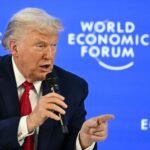President Yoon Suk Yeol (left) and Philippine President Ferdinand Marcos Jr. shake hands during their summit at the Malacanang Palace in Manila on Oct. 7, 2024
MANILA – South Korea on Monday signed an initial agreement with the Philippines to conduct a safety check on a nuclear power plant before a restart – a move widely expected to enhance the chances for Seoul to participate in a series of nuclear power plant projects in the Southeast Asian countries.
During Korean President Yoon Suk Yeol’s state visit to the Philippines, the two countries also elevated bilateral relations to a “strategic partnership” to strengthen their cooperation in security, economy, energy and other areas, Seoul’s Presidential Office said.
Under the strengthened partnership, Korea has agreed to actively participate in the three-phase Philippine military modernization program, estimated to cost $35 billion over the next decade, creating an opportunity for Korea to export advanced weapons systems to the country.
Korea has already exported FA-50 light attack aircraft, warships and missiles to the Philippines.
“The establishment of the strategic partnership opens a new chapter in our bilateral relations,” Yoon said in a joint press conference with his counterpart, Ferdinand Marcos Jr.
The two leaders also discussed expanding joint military training involving South Korean forces in the Philippines.
A nuclear power plant in South Korea operated by Korea Hydro & Nuclear Power (Courtesy of KHNP)
The strategic partnership came after the two nations established diplomatic relations in 1949. The Southeast Asian nation sent the first and largest troop of 7,420 soldiers to South Korea when the Korean War broke out in 1950.
‘BEST NUCLEAR PLANT PARTNER’
At a press conference following their summit meeting in Manila on Monday, President Yoon said: “Team Korea will become the best nuclear plant partner for the Philippines.”
In response, President Marcos said: “We hope to actively cooperate with Korea on nuclear energy.”
During the summit held at the Malacañang Palace, the leaders signed a memorandum of understanding (MOU) allowing Korea Hydro & Nuclear Power Co. (KHNP) to conduct a feasibility study on restarting the Bataan Nuclear Power Plant.
The power plant on the Bataan peninsula, about 100 km west of Manila, began construction in 1976 but construction work was halted just before completion in 1984 due to growing public opposition. Following the 1986 Chornobyl nuclear disaster, the Bataan plant’s completion and operation were canceled.
However, a turning point came when President Marcos, who took office in 2022, pushed for the revival of nuclear power to address the nation’s energy crisis, reigniting hopes for the restart of the Bataan project.
South Korean President Yoon (second from left) and Philippine President Ferdinand (third), accompanied by their finance ministers, agree on the Economic Innovation Partnership Program at the Malacanang Palace
The two leaders have already discussed issues of restarting the nuclear power plant at their previous summit meetings, followed by a series of working-level talks.
The Philippine government plans to decide whether to restart the Bataan plant based on the feasibility study, which is expected to take about six months.
The Bataan plant is equipped with a light water reactor from US energy firm Westinghouse Electric Corp. with a capacity of 621 megawatts – the same design as Korea’s Kori-2 reactor.
“The Bataan plant has the same reactor as Korea’s Kori-2. The KHNP has over 40 years of experience operating the Kori nuclear plant,” Park Chun-seop, Yoon’s senior presidential aide on economic affairs, told reporters.
At the summit with Marcos, Yoon highlighted Korea’s track record of nuclear power plant exports, including a deal with the United Arab Emirates for the Barakah Nuclear Power Plant and its selection as the preferred bidder for a Czech Republic nuclear power plant project.
The Philippine government plans to build three nuclear power plants by 2050.
Analysts said if Korea completes the feasibility study, it will gain the upper hand in winning nuclear power plant construction projects in the Philippines.
The construction site of the Barakah nuclear power plant project in the UAE
COOPERATION IN INFRASTRUCTURE, MINERALS
In addition to the nuclear cooperation, the two leaders signed 21 other MOUs, including on infrastructure development and cooperation in raw material supplies.
In a related move, Korea agreed to provide $905 million in aid through its Economic Development Cooperation Fund (EDCF), a low-interest loan program to support infrastructure projects in developing countries, for the Laguna Lakeshore Road Network project.
Korea will also extend $1 billion in the EDCF program for the PGN bridge project connecting three central Philippine islands of Panay, Guimaras and Negros.
The amount – Korea’s largest-ever EDCF support – is expected to pave the way for Korean builders to join in future Philippines construction projects, industry officials said.
The mineral supply MOU is expected to help Korea in case of supply chain disruptions.
The Philippines is the world’s second-largest nickel producer and the sixth-largest cobalt producer.
South Korea’s FA-50 light fighter aircraft
TFA TO TAKE EFFECT SOON
In an interview with the Philippine Star, an English newspaper, President Yoon said he expects bilateral trade and investment to significantly expand once the Philippines-South Korea free trade agreement (FTA) takes effect.
“The Philippines, with its young and dynamic population and abundant resources, and South Korea, with its high capabilities in manufacturing and advanced industries, have immense potential for cooperation,” he said.
The two governments signed the FTA in September 2023, and last month the Korean government submitted the FTA deal to the National Assembly for ratification.
On the sidelines of the summit, the two presidents and more than 300 business leaders from the two countries participated in a business forum held at a Manila hotel.
Korea was represented by Samsung Electronics Co. Chairman Jay Y. Lee, Federation of Korean Industries (FKI) Chairman Jin Roy Ryu, Hanwha Aerospace Co. Vice Chairman Kim Dong-kwan, HD Hyundai Co. Vice Chairman Chung Ki-sun and Korean Air Lines Co. Chairman Cho Won-tae.
By Gil-Sung Yang
vertigo@hankyung.com
In-Soo Nam edited this article.














